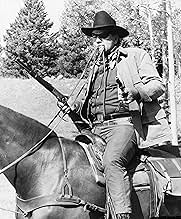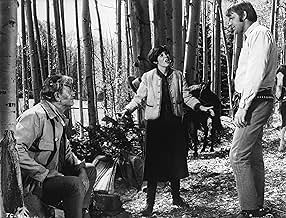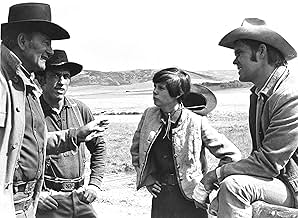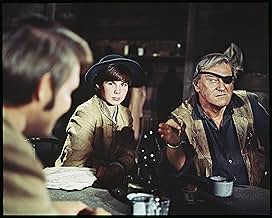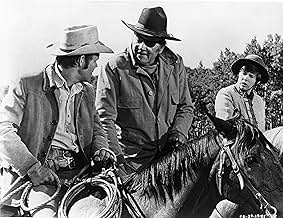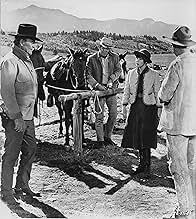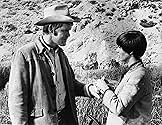Un duro Maresciallo degli Stati Uniti e un Texas Ranger aiutano un'adolescente testarda a rintracciare l'assassino di suo padre nel territorio indiano.Un duro Maresciallo degli Stati Uniti e un Texas Ranger aiutano un'adolescente testarda a rintracciare l'assassino di suo padre nel territorio indiano.Un duro Maresciallo degli Stati Uniti e un Texas Ranger aiutano un'adolescente testarda a rintracciare l'assassino di suo padre nel territorio indiano.
- Regia
- Sceneggiatura
- Star
- Vincitore di 1 Oscar
- 6 vittorie e 7 candidature totali
Recensioni in evidenza
In movies, the desire to please as wide an audience as possible seems always to win out, effectively robbing most westerns of the motion picture's essential gambit; the suspension of disbelief. It's very hard to lose oneself in a tale of the late 1800's when the female lead's eye-liner and coiff are pure 1950. Or 1940, 1960, whatever. In True Grit, very little of 1969 is allowed to intrude on this rather simple tale of justice and revenge. This movie is anchored by two very strong themes, shared by all the actors, across most of the scenes.
The first, is language. The dialogue is an absolute delight. Crack open anything by Mark Twain, Henry James or any other late 19th century author, and you will see that people really did speak differently 150 years ago. That the dialogue in 99% of westerns is straight from the time of their filming is a travesty, at best.
Second, is innocence. Not that of any one character however, but the innocence of the human race as a whole. It is probably almost impossible for any of us now, in this day and age, to truly imagine what it must have been like to live back when. But one thing's sure, people were much more naive. There was no such thing as mass-communication, a good percentage of the population didn't read, and newspapers, the only "organized" form of news at the time, were hard pressed to report on anything more than a day's ride from town.
This basic, shared innocence is achingly portrayed by Robert Duvall in two short sentences near the end of the movie when he's caught Mattie and he's attempting to threaten her. Study those two lines, and you'll see that "Lucky" Ned Pepper, the worst villain in the story, really has no idea of what he could possibly do to a slip of a girl. He's totally at a loss. The unspeakable, modern-day atrocities we consume every day with our coffee and bagels are so far from contemplation by Duvall's character, that all he can do is assure her, "I'll do what I have to". It's a priceless moment - frighteningly accurate commentary wrapped in two lines of simple dialogue, delivered with dead-on interpretation.
The only other western I can think of at the moment that delivers with such viscerally historic accuracy is "Unforgiven".
MjM
However, the film does look great. Handsomely shot with great scenery, True Grit is pleasing to the eye. Elmer Bernstein's score is rousing and very fitting, while the story is interesting, most of the characters are credible and the script flows well. Also True Grit is very well directed, and there is a glorious final shoot-out. Other than Campbell and Darby, the other acting is fine. While I would have not personally given the Oscar to this particular performance(I thought he was better in The Searchers, Red River and The Quiet Man) John Wayne is excellent here, and while he doesn't appear until quite later on Robert Duvall also makes a positive impression.
All in all, a very good film but could have been better in my view. 7/10 Bethany Cox
What True Grit does is succeed on both levels, being both great entertainment and giving John Wayne the acting role of a lifetime in the person of Rooster Cogburn.
Mattie Ross from Darnell and Yell County Arkansas personified by Kim Darby has come to Fort Smith seeking the killer of her father Jeff Corey. Turns out he's also killed a State Senator in Texas so Texas Ranger Glen Campbell informs her. Both of them team up with United States Marshal Rooster Cogburn who resides in Fort Smith with Chin Lee and my favorite movie cat, General Sterling Price.
Corey is now in the outlaw band headed by Robert Duvall at large in the Indian Nation Territory that became Oklahoma. True Grit's plot is the trio's pursuit of Duvall, Corey and the rest of the gang.
But oddly enough True Grit isn't really about plot. It's about the creation of a character. Like Margaret Mitchell who wrote Gone With the Wind with Clark Gable in mind for Rhett Butler, Charles Portis wrote the novel True Grit with only John Wayne in mind as Rooster Cogburn. It must have been one singular delight for Charles Portis to see the Duke flesh out Rooster Cogburn exactly as he conceived him.
Tough old Rooster, likes an occasional drink, isn't above a little larceny, but has one stern moral code about real bad guys. Bring him in dead or alive and make sure you shoot first coming up against them. And he's got quite the colorful past as he relates tales of his younger days to Campbell and Darby on the trail.
In other reviews I've said that John Wayne had one of the great faces for movie closeups. You can see a perfect example of that in that scene with John Fiedler who plays Darby's lawyer J. Noble Daggett. A man who rates high in the legal profession in that area having forced a railroad into bankruptcy.
The camera is facing Fiedler as he's talking to Wayne about his visit with Darby who's life Wayne saved. Wayne's got about a third of his face to the camera. But even with that third, your eyes are focused on the Duke and his reactions and then as the camera slowly pans around to Wayne in full face his reaction shots are hysterical. You don't work with scene stealing character actors like Chill Wills, Walter Brennan, and Gabby Hayes for 30 years without learning something.
John Wayne was up against some stiff competition in 1969 for the Best Actor Oscar. It was his second nomination, the first being for Sands of Iwo Jima. He was facing Richard Burton as Henry VIII in Anne of a Thousand Days and a couple of newcomers named Dustin Hoffman and Jon Voight for Midnight Cowboy. He was certainly the sentimental favorite.
If in no other place in our lives, sentiment does have its place in cinema. It was an honor well deserved, not just for one performance but for a lifetime of achievement in cinema being the player who put more people into movie seats than any other person ever. So many of the Duke's contemporaries like Edward G. Robinson, Errol Flynn, Tyrone Power were never even nominated for an Oscar much less win one.
Because the Motion Picture Academy has deemed this John Wayne's grandest cinematic achievement, it's almost a command to support this fine western and the man who defined the western hero and is still defining it.
John Wayne's parting comment in this film is directed as much at us the viewers as it is at the young woman his Rooster Cogburn character is addressing. In a way, Wayne throughout the film plays off the image he cemented in dozens of great and near-great westerns, with a nod that by 1969, he along with the western genre had fallen behind the times, that his shoot-first approach to law and order had worn thin with the critical establishment just as it does in Judge Parker's courtroom.
In that way, playing a character of such dogged homicidal cussedness as the hard-drinking, one-eyed ex-Quantrill Raider Rooster Cogburn and giving him a teenaged girl seeking justice to play off so as to showcase his essential decency seems a clever means to win Wayne an Oscar, which he finally did here, a sentimental triumph over some more heralded performances. With such an attitude, you might think "True Grit" would come off a bit of a one-trick pony 37 years on. But it doesn't. In many ways, both the film and Wayne's performance come off better than ever.
Helping matters a lot is the support Wayne receives from two women. As the heroine, Matty Ross, Kim Darby provides Wayne with a fantastic foil, doughty to the point of rudeness, forever finding fault in others but earning your good will through her simple faith in justice and loyalty to the memory of her slain father, for whom she wants Rooster's help avenging. As she is told by a horse dealer she banters with: "I admire your sand."
The other is Marguerite Roberts, whose adaptation of Charles Portis' novel bristles with good humor and an ear for the period. "If ever I meet one of you Texas waddies who ain't drunk water from a hoofprint, I think I'll... I'll shake their hand or buy 'em a Daniel Webster cee-gar," Rooster tells his braggart riding companion, a young Texas Ranger played by country singer and ex-Beach Boy Glen Campbell.
Campbell may be a novice and a third wheel in the interplay between Wayne and Darby, but he acquits himself well and delivers a worthy performance in a cast stacked with talented actors like Robert Duvall, Jeremy Slate, and Strother Martin, not to mention Dennis Hopper, hiding the long hair he made famous in "Easy Rider" that same year. Some of these actors portray bad guys, but Roberts' script and director Henry Hathaway's languid pacing allow them to present some humanizing qualities that go a long way toward making "True Grit" more than your typical shoot-em-up oater.
Even Jeff Corey, who plays a no-account named Chaney who shot Matty's father, has a funny scene when he tells Matty how to cock her pistol, then whines after she shoots him with it: "Everything happens to me!"
About the only fault I can find with the film is Elmer Bernstein's bombastic score, which employs overly ornate orchestration like kettledrums when Matty has her showdown with Chaney and is tuneless apart from the title song, which is Campbell's best moment here. Hathaway's direction is somewhat pedestrian but serves the script, and showcases some incredible autumnal vistas of tall birch and pine where Rooster and Matty search for Chaney, photographed by Lucien Ballard in a style akin to (but more dreamy than) his work on the same year's "The Wild Bunch."
1969 was the last great year for westerns, with this, "The Wild Bunch," "Butch Cassidy And The Sundance Kid," "Support Your Local Sheriff" and "Once Upon A Time In the West," and its interesting how Ballard, Corey, and Strother Martin turned up in more than one of them. But good westerns never really go out of style, they just sit on the shelf awhile like an old Stetson waiting to be rediscovered. Nobody wore a Stetson better, or deserved an Oscar more, than John Wayne. "True Grit" does the double duty of showing why he was a star and further burnishing his luster.
Lo sapevi?
- QuizStunt double Jim Burk performed the entire scene where Rooster Cogburn charged Ned Pepper's gang on horseback. John Wayne was only seen briefly in close-up, and he was riding on a trailer, not a horse.
- BlooperRooster reports Lucky Ned Pepper had robbed the KATY Flyer, a train that did not start running until 1896, long after the time in which the story is set.
- Citazioni
[Rooster confronts the four outlaws across the field]
Ned Pepper: What's your intention? Do you think one on four is a dogfall?
Rooster Cogburn: I mean to kill you in one minute, Ned. Or see you hanged in Fort Smith at Judge Parker's convenience. Which'll it be?
Ned Pepper: I call that bold talk for a one-eyed fat man.
Rooster Cogburn: Fill your hand, you son of a bitch!
- Versioni alternativeWhen submitted for a rating from the MPAA in 1969, the film was given an "M". The film was edited and rerated "G". The American VHS version contains the "G" rated cut while the DVD is the uncut "M" version (which would be printed as "PG" since the symbol was changed in the 1970s).
- ConnessioniEdited into The Kid Stays in the Picture (2002)
I più visti
- How long is True Grit?Powered by Alexa
Dettagli
- Data di uscita
- Paese di origine
- Sito ufficiale
- Lingua
- Celebre anche come
- Temple de acero
- Luoghi delle riprese
- Azienda produttrice
- Vedi altri crediti dell’azienda su IMDbPro
Botteghino
- Lordo Stati Uniti e Canada
- 276.418 USD
- Fine settimana di apertura Stati Uniti e Canada
- 157.788 USD
- 5 mag 2019
- Lordo in tutto il mondo
- 276.418 USD
Contribuisci a questa pagina



